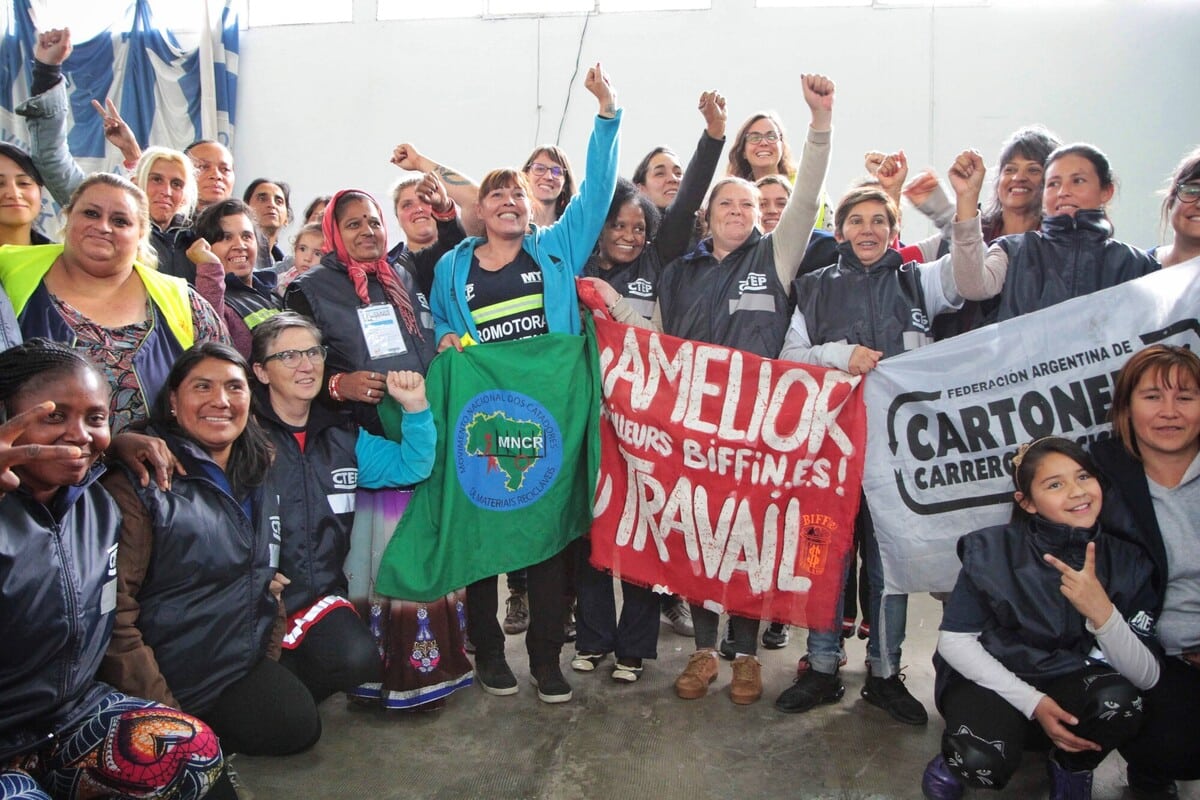Workers around the world are experiencing the storms of a geopolitical and economic system in flux. The sweeping tariffs announced –then paused– by the Trump administration have generated widespread uncertainty and fear over a looming recession. We know that when global supply chains were interrupted during the Covid-19 crisis, it decimated the incomes of many workers in informal employment. There are clear risks of similar consequences for workers in the present moment. At the same time, reports indicate that democracy has continued to decline in 2024 with concerning back slides in indicators on freedom of expression, economic equality and access to justice. And, with the weakening of democratic institutions, and the rise of authoritarianism, we see mounting attacks on freedom of expression, the right to organize and the independence of civil society.
Amidst this global uncertainty and attacks on movements, we hold firm in our belief that weathering these storms means coming together; it means continuing to organize, continuing to build movements, and continuing to build alliances across movements, even in the face of opposition. And in doing so, we must give space for women workers to lead and represent, and pay closer attention to the strategies and knowledge emerging from their grassroots democratic practices.
Organizations of Workers in Informal Employment Play A Central Role in Upholding Democracy & Supporting the Public Good
Organizations of workers in informal employment play a central role in upholding democracy, fighting for workers’ rights and challenging systemic injustice. When communities’ rights are under threat, they organize, build power, create resistance from the grassroots and advocate for change. Their movements act in the interest of the public good, often when powerful state and corporate actors are working to maintain an unequal and unjust status quo.
When workers in informal employment come together, and work in alliance with formal workers, women’s rights organizations, the cooperative movement, the environmental movement and others, they have demonstrated their capacity to forge progressive change:
- In Delhi, India, a coalition of allies representing informal workers’ rights, housing rights, environmentalists and others launched the Main Bhi Dilli (“I, too, am Delhi) Campaign, which sought to create a more just and inclusive Master Plan for Delhi 2041. Though in many areas the adopted Master Plan falls short in operationalizing an inclusive vision, it does recognize the informal economy as the main employer in the city and includes provisions to provide infrastructure for health and childcare facilities in informal settlements. And, the campaign created a strong coalition of allies who continue to work together on issues related to informal work in public spaces, evictions, housing policies, and waste management.
- In Brazil, different sectors of workers in informal employment established a joint platform in June 2024. The platform brings together representatives from organizations of street vendors (UNICAB), waste pickers (MNCR), home-based workers (ATEMDO), domestic workers (FENATRAD), and app-based drivers and delivery workers (SIMTRAPLIRS and SEAMBAPE), along with CUT Brasil and WIEGO. The collective has worked with the national government to set up a space for dialogue that includes representatives from the Ministry of Labor, the General Secretary’s Office, federal deputies and the ILO Director. The group seeks to raise awareness about workers’ needs through WIEGO action research initiatives and to push for policy changes that guarantee the rights of workers in informal employment.The group’s platform of demands calls for the implementation of Recommendation 204, the ratification of ILO Conventions (177, 190, 189, 184, 206, 201 and 202), concrete policies to decriminalize informal work, the strengthening of social solidarity economy policies such as the National Registry of Social Solidarity Enterprises, and greater attention to the physical and mental health of workers in informal employment, amongst others.
- HomeNet International and its national and regional affiliates worked closely with civil society and trade union allies including Asia Floor Wage Alliance, the Clean Clothes Campaign, WIEGO and others to advocate that homeworkers’ rights be recognized and protected under the European Union Corporate Sustainability Due Diligence Directive. Though an Omnibus Proposal introduced in 2025 threatens to water it down, the Directive includes provisions to protect all workers in the supply chains (including homeworkers) - a major victory. This group of allies continues to fight to ensure homeworkers’ rights are protected in supply chains as the Directive is translated into national laws.
- At the global level, domestic workers built alliances with the formal trade union movement (including ITUC and IUF), ILO officials and civil society organizations (including the Global Labour Institute, WIEGO and others) in their campaign towards an international labour standard on domestic work. Domestic workers used the process to establish the International Domestic Workers Network (now the IDWF) in 2009, and worked with allies to successfully negotiate for a Convention on Decent Work for Domestic Workers (C189) in 2011. In 2024, the IDWF gained recognition as a global union federation and became a member of the Council of Global Unions, marking a major milestone for domestic workers everywhere.
These experiences show what’s possible when we work collectively across movements from local to global levels - and that our struggle must be continuous.
On this May Day, we make a call to progressive labour and social movements. We must stand firm –and stand united– for social justice and democratic principles. Let these storms build us, not break us.
